John H. Prescott Fund
Funding cuts a huge blow to Washington State marine mammals
Oct/04/13 02:54 PM
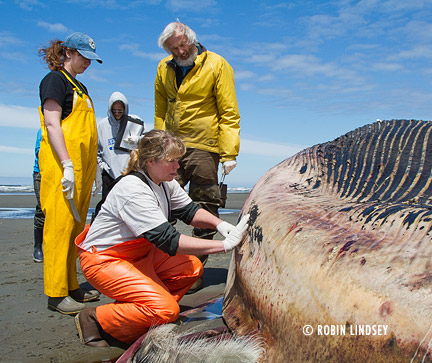
As a critical member of NOAA’s Northwest Marine Mammal Stranding Network, WDFW-MMI provides marine mammal response and triage to a wide geographic area, including both inland waterways and the outer coast of Washington. The public not only expects, but demands that marine mammals, alive or dead on the beach, be tended to (such as the fin whale shown here on an Ocean City beach in June). It puts both the animals and the public in danger if there is not a professional response to these strandings.
Washington State takes great pride in our marine mammals. We should take all necessary steps now and set aside Sate funding to ensure their protection, independent of Federal grants. The scientific work performed by WDFW-MMI is crucial to the health of marine mammals and of our State’s marine ecosystem. WDFW- MMI is one of the few organizations in place in Washington State to perform marine mammal necropsies. Most stranding networks in the Pacific Northwest turn to them for advice because of their decades of expertise and behavioral observations. The value of this collaborative relationship is incalculable. This “citizen science” mentoring of network volunteers across the region greatly assists the State in its work protecting marine wildlife.
The amount of research that has been performed by WDFW-MMI, often in conjunction with other members of the NWMMSN, is both impressive and important - from monitoring emerging disease in marine mammals to the devastating impact of contaminants. Their studies of harbor seals, a sentinel species, reveal the health of our marine ecosystem as a whole. Their 2005 study revealed that harbor seals in South Puget Sound were 7 times more contaminated with PCBs and other toxins than those living in Canada’s Georgia Strait. Without WDFW-MMI’s response, we would not have known that Guadalupe Fur Seals have returned to the outer coast of Washington after many decades of absence. We would not know of the transfer of land mammal diseases to marine mammals and other emerging zoonotic diseases. It is imperative that this work be funded and continue.
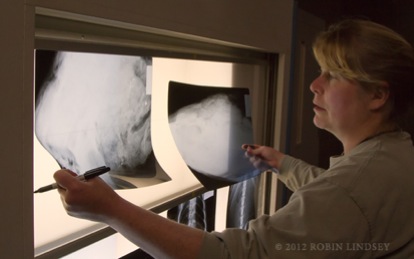
For the past 7 years, Dyanna and the WDFW-MMI team have provided immeasurable support to Seal Sitters MMSN. They have been our sole resource for necropsy to determine mortality of seal pups, adult seals and sea lions and harbor porpoise. She has generously mentored our network, sharing her knowledge and improving our ability to assess animals during response. Seal Sitters has now responded to 12 dead seal pups (2 today) this 2013 harbor seal pupping season - almost all of them horribly thin. Our official start date for pupping season in West Seattle was July 19th with a response to a stillborn pup at Harbor Island. This is the highest number of dead pups this early in pupping season in the years Seal Sitters has been responding to marine mammals. With WDFW-MMI resources no longer available for necropsy, we will have no means to determine cause of mortality of marine mammals - other than high profile whale strandings or, perhaps, shooting investigations.
What cannot be measured or replaced is the passion and leadership of Dyanna Lambourn. The interns (and future marine mammal biologists) studying under her get an intensive and unique opportunity for hands-on experience with marine mammals, learning biology and behavior. However, what cannot be taught is passion. Passion is inspired by leadership and example. There is no one in those categories who can surpass Dyanna Lambourn, whose interns work tirelessly, as she does, at her side.
STATE FUNDING SHOULD BE IN PLACE TO HELP MARINE MAMMALS
WDFW-MMI provides tremendous value to Washington residents, playing a pivotal role in protecting and preserving the marine wildlife we all treasure. Please contact your State representatives, State senators, and Governor Jay Inslee. Let them know that protecting our marine mammals is important to you. Request that the State set aside some funding so that this critical WDFW-MMI team can continue their research and support of other members of NOAA’s Northwest Marine Mammal Stranding Network. Please email WDFW’s Director - let him know that you care about marine mammals and that research and response should remain an integral part of WDFW’s work. Washington State should not depend on dwindling funds from the Federal Government to ensure our marine mammals are protected.
PRESCOTT GRANT FUNDS NEED TO REMAIN IN THE NATIONAL BUDGET
Federal Prescott funding for 2013 was slashed from roughly $4 million (with approximately 40 grants awarded annually to stranding networks across the country) to just over $1million - and only a dozen grants awarded this year for the entire nation. Read Wired Magazine’s report on the impacts of this decimated funding here.
To read more about how NOAA’s Marine Mammal Stranding Network depends on this funding for both response and research, click here. Contact your representatives in the US House of Representatives and US Senate - tell them marine mammals are important to you and insist that Prescott grant funding be included in the President’s 2014 FY Budget. This tiny part of the many billion dollar Federal budget is in jeopardy of disappearing entirely in the near future. We need to act now to ensure critical research and protection of marine mammals!
Dead fin whale comes ashore on Washington coast
Jun/14/13 11:48 AM
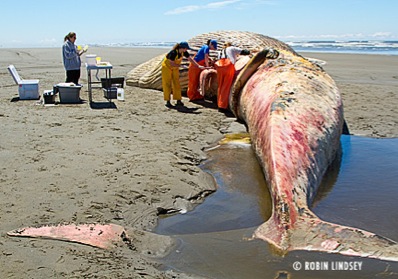
The adult male whale was moderately decomposed with most of the skin missing. The lower jaw of a fin whale has an asymmetrical coloration of the baleen (black on the left side and creamy white on the right side), a physical characteristic of this species which aided in the identification of the whale. There was significant bruising and evidence of blunt force trauma consistent with a ship strike.

Dangers still exist for fin whales, however, as ships move through krill feeding grounds where the whales forage near the surface - easy victims for ship strikes. This is the second fin whale to wash ashore this year on Washington beaches, both attributed to ship strikes.
NOTE:
Responses such as the one yesterday by members of NOAA’s Northwest Marine Mammal Stranding Network rely on critical funds from the John H. Prescott Marine Mammal Rescue Assistance Grant. Recently Prescott funding was slashed from $4 million (for the entire nation) to a mere $1.4 million. Additionally, it has been eliminated completely from the proposed 2014 Federal Budget. These grants fund the scientific research necessary to monitor the health of our marine ecosystem and ensure timely response by groups all across the US to protect both marine mammals and the public. Read more about this essential program and how to contact your congressional representatives to restore Prescott funds.
Year of the Seal kickoff event a success
Apr/24/13 08:25 AM
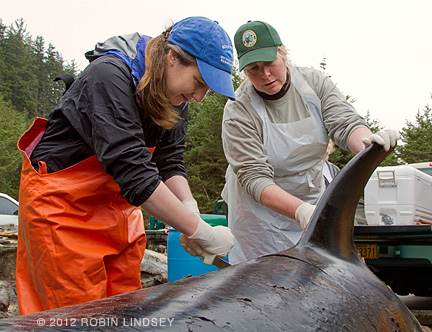
The Year of the Seal educational outreach project is intended to raise awareness of human impact on our fragile marine ecosystem - and that one person truly can make a difference by the choices we make regarding litter and plastics, pesticides and fertilizers. Click here to learn more about the project and sculpture by Northwest artist Georgia Gerber. Thanks to the volunteers at the event who made a donation to help us raise funds for the landscape and installation phase of the sculpture project.
Huge thanks to Dyanna and Jessie for giving up their Saturday to educate our volunteers who were fascinated by this glimpse into the world of marine mammal “CSI”. The funding for research into emerging diseases, contaminants and methods to help alter the deadly collision course of whales and shipping vessels is largely made possible by the John H. Prescott Fund, which has been eliminated from the proposed 2014 Federal buget. For more information and links to contact your congressional representatives asking to reinstate Prescott funding, click here.
Dead fin whale washes ashore in Burien, victim of ship strike
Apr/13/13 11:57 PM
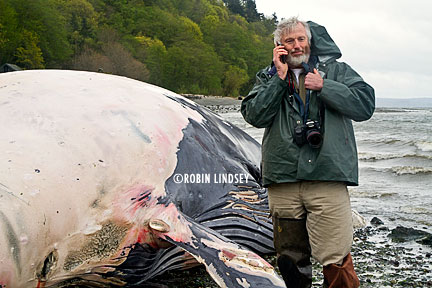
A dead adult fin whale, the apparent victim of a ship strike, washed onto the beach of Seahurst Park mid-morning today. Biologist Dyanna Lambourn and interns from WA Dept. of Fish and Wildlife Marine Mammal Investigations (WDFW-MMI), Cascadia Research biologists John Calambokidis and Jessie Huggins, and staff and students from MaST Center of Highline Community College examined the whale and answered questions from the public. Seal Sitters volunteers participated as well.
Most of the rear half of the whale was missing, but the animal was estimated to have been approximately 65 ft in length when intact. Fin whales are the second largest species of whales with a maximum length of 75 ft. Bruising from brunt force trauma is an indication that the whale was still alive when struck by the bow of a large ship. Red paint from the ship was on the whale’s body. Fin whales, an endangered species, are susceptible to mortal wounds because of their size and their tendency to feed near the water’s surface. Since 2002, Cascadia reports there have been 10 stranded fin whales in Washington waters, 8 of which had evidence of vessel collisions (including today’s whale).
These large baleen whales are vulnerable to ship strikes as they travel in waters along our Pacific coast, particularly in busy shipping lanes such as Los Angeles and Long Beach, California. Gray whales and their calves migrate from Baja California to Alaska through these containership congested waters. Blue whales, the largest of all cetaceans and listed as endangered, are in peril of deadly collisions as they forage on krill in the shipping lanes. In 2007, three blue whales were struck and killed by ships in the Santa Barbara Channel.
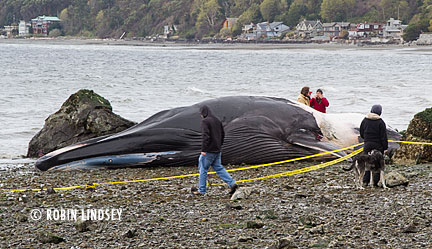
The WDFW-MMI and Cascadia team is making efforts to have the animal towed to a remote location for necropsy. Read Cascadia’s preliminary report here. Studies by both Cascadia and WDFW-MMI on whales and vessel interactions can be found on Cascadia’s website.
Responses such as this by members of NOAA’s NW Marine Mammal Stranding Network are in large part funded by the John H. Prescott Fund, which has been eliminated from the 2014 fiscal year Federal budget. Contact your congressional representative here, asking that this critical funding be restored.
RELATED NEWS MEDIA LINKS
KING 5 TV
KOMO 4 TV
UPDATE 4/15/13
NOAA’s NW Marine Mammal Stranding expert reports that they are working with several groups, including the City of Burien and Burien Parks and Recreation, to find a solution to both crowd control and the removal the fin whale at Seahurst Park. Large whale strandings are extremely complicated situations, usually taking 3-5 days to resolve. Since the backbone and rear half of the whale is missing, towing the whale either to another location for necropsy or to sink in the Sound is difficult. There is no fluke to tie rope to and towing the whale by the head causes too much drag for most vessels to handle. NOAA is trying to find an educational or scientific facility interested in obtaining the skull.
After a chaotic Sunday with hundreds of onlookers at the beach, many touching and climbing on the whale, Parks is establishing a tape perimeter with signage, in hopes to keep people safely away from the immense whale. Marine mammals can carry infectious disease. Touching the animal carcass or blood and bodily fluids is inherently dangerous. Please admire this magnificent whale from a safe distance.
Act now - marine mammal funding eliminated from Fed's budget
Apr/12/13 01:53 PM
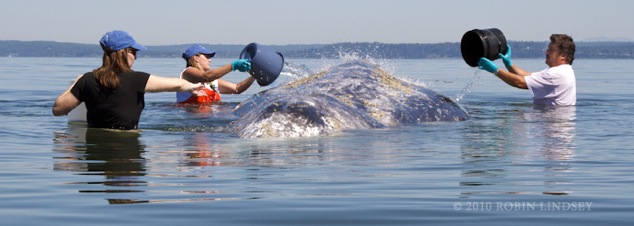 (update: Prescott will be included in the 2014 budget, but funding is greatly slashed)
(update: Prescott will be included in the 2014 budget, but funding is greatly slashed)Yesterday it was learned that critical funding for marine mammal stranding response and research has been eliminated from the proposed fiscal year 2014 Federal budget and NOAA budget. Nationwide, marine mammal stranding networks are run through non-profits and other non-government entities and coordinated through NOAA’s National Marine Fisheries Service (NMFS). These networks are heavily dependent on funding from the John H. Prescott Marine Mammal Rescue Assistance Grant Program.
Stranding networks are the nation’s first responders to both live and dead marine mammals that come ashore (or are entangled off shore), often in urban coastal communities. Responders are usually the only means of intervention between wild and potentially dangerous marine mammals and a curious, but largely unwitting, public. Additionally, network responders collect biological specimens from stranded animals to monitor emerging, infectious, and zoonotic (transmissible to people) diseases in areas frequented by the public.
Infectious diseases have been showing up in marine mammals at an alarming rate in recent years. Network responders play an essential and unique role in identifying dangerous pathogens in marine mammals that share our shores. Their work is not only necessary for minimizing risks to public health and safety, but for developing a better understanding of the health risks facing these animals and our marine ecosystem.
Marine mammals are sentinels for the health of our oceans - and our first line of detection of ominous changes in the marine environment.
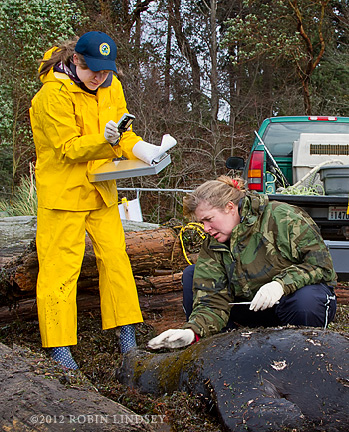
The public demands a response to marine mammals in need and the elimination of Prescott Funds for response and research will drastically impact this ability. There will be severe public backlash when animals cannot be responded to at the level the public expects. For both public and animal safety, strandings are best responded to by trained individuals. Without a professional response to strandings, the public will resort to taking matters into their own hands, with the potential for injury or death to humans.
Rehabilitation facilities across the country also depend on Prescott Funding for their work and will be severely compromised. Some will close. Many largely-volunteer networks will cease to exist without this funding.
Please contact your congressional representative and stress the need for Prescott Funds to be reinstated for this essential work. The Prescott Fund is a minute percentage of the Federal budget. International Fund for Animal Welfare (IFAW) has an easy method to contact Congress and make your voice heard. Please click here to act now!
You can also contact the President via the White House website. Click here to ask President Obama to reinstate the John H. Prescott Grant Program.
NOTE:
Seal Sitters receives no Prescott Funding (or financial support from any Federal, State or City agencies) for our work. We rely on public contributions for our stranding response and educational outreach. If you’d like to make a donation, please click here.
Read here about Seal Sitters’ Year of the Seal grant project, designed to raise awareness about human impact on marine mammals and the health of our marine ecosystem.
Strange and unsettling seal pup season
Oct/29/12 06:06 AM
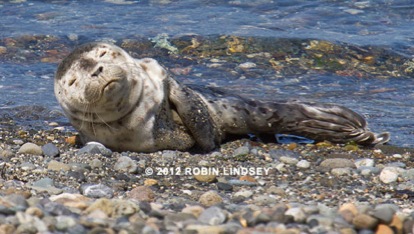
We want to assure people that this does not mean we have a seal pup “death epidemic”. Harbor seal pups only have a 50% chance of surviving their first year. This is due to many factors, including predation and disease. This means, in theory, one out of every two pups that our volunteers watch over can perish. And we do respond each year to numerous dead animals. However, in West Seattle our response mortality rate has just never come close to approaching such a high percentage at this point in the season as our current 44% rate for 2012. But what has been equally unsettling is that so many of our live pups this year have been terribly thin. As we still have two full months remaining in 2012, our total pup deaths will undoubtedly exceed last year’s count, but the mortality percentage will change - hopefully, for the better and not worse. Winter months pose grave difficulties for weaned seal pups. At the end of the year, we will post our final statistical findings.
Harbor seals are considered by biologists to be an indicator species for the health of our waters. Year-round residents, they do not migrate. Harbor seal pups are especially vulnerable to any kind of imbalance in our waters, including contaminants and disease, due to an already weakened immune system. While nursing, a pup has the benefit of partial immunity from mom’s milk. However, once the pup is weaned, there is little protection from emerging diseases. Contaminants, such as flame retardants and storm runoff, pose tremendous risk to seal pups (as well as all living marine organisms - read more on our website) and contribute to virus infection. Additionally, a pup usually drops a fair amount of body weight after being weaned and trying to forage on his own. Opportunistic parasites, such as lungworm, take advantage of this further suppressed immune system, often leading to respiratory disease and pneumonia, a very difficult health challenge for a pup to overcome.
We want to stress that at this juncture we have no idea if there is an underlying link causing these thin pups and deaths, but have been consulting with a prominent marine mammal biologist and inquiring as to statistics from other stranding networks. Perhaps we simply have fewer healthy pups hanging out in West Seattle because there is not a sufficient food source in our area this year. Perhaps if food sources were depleted, moms didn’t nurse the full 4-6 weeks, leading to weaker pups. Or, could there be something else going on?
Research is critical to monitoring the health of harbor seal populations and that of the Sound. Unfortunately, there is inadequate funding for crucial, and relatively expensive, tests. Federal Prescott Funds which support the vital work of NOAA’s nationwide marine mammal stranding networks is on the chopping block to be eliminated from Congress’ 2013 budget. It was not included in the president’s budget proposal. This funding enables networks across the country to respond to stranding and mortality events and perform scientific research into infectious marine mammal diseases, such as brucella and the lethal morbillivirus.
For the past 6 years, Seal Sitters has delivered fresh dead seal pups to WDFW Marine Mammal Investigations Unit for necropsy. Because of this research, several years ago a human virus (reovirus) was isolated in those pups. This meant that our urban seals were coming into contact with human sewage - and probably many other species in the Sound were in contact with sewage as well. Currently, the WDFW biologist is waiting for results on tissue samples from two of our 2012 pups to help determine cause of death. Many emerging diseases are transmitted between species. Recently, research discovered that a parasite known only to land mammals was found in marine mammals. This was apparently due to cat feces reaching marine waters. You don’t have to be a scientist to realize this cross-species infection of disease can be devastating on many levels.
We cannot stress enough that funding for this critical research needs to continue. Please email your congressional representatives, insisting that John H. Prescott Funds be included in the 2013 Federal budget. The health of our seals - and the Salish Sea - affects all of us.
Please remember that all seal pups are struggling to survive. Observe them quietly from a distance.







